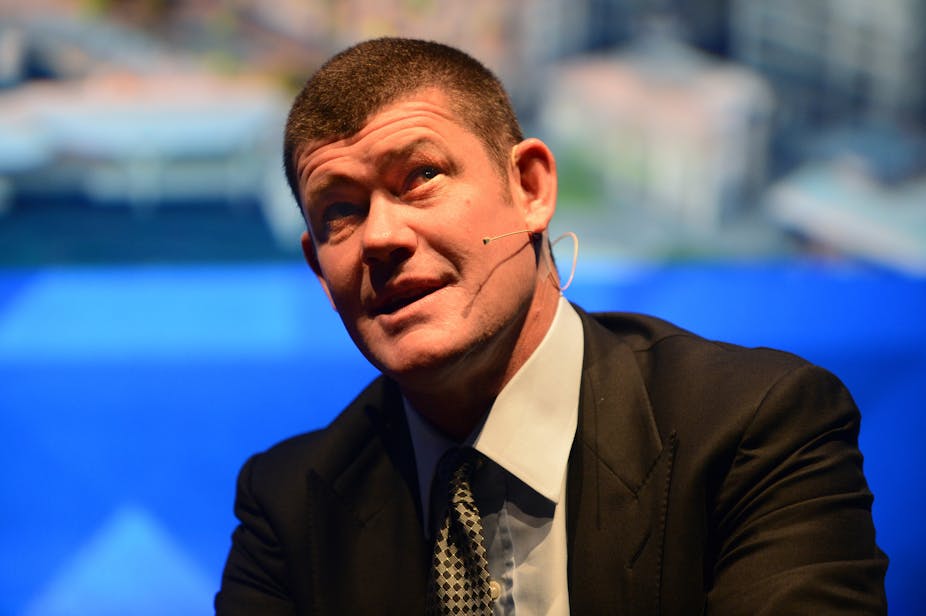When is a casino not a casino? According to NSW premier Barry O’Farrell, who last week approved James Packer’s Crown Limited bid to establish Sydney’s second casino, a casino isn’t a casino without pokies. Instead, Crown has been granted approval to develop what O’Farrell calls a “VIP gaming facility”.
Rather than relying on local pokie players to provide a revenue stream, the proposed 70-storey venue at Barangaroo has ambitions to attract lucrative “high-roller” gamblers. These gamblers would, according to Crown, choose to gamble in Sydney rather than Macau, Singapore or other casino hubs closer to home. This will be no small achievement. As Packer himself noted: “the economics on this project are tough”.
Given the challenges of attracting an elite group of Asian gamblers to Sydney in the face of stiff, more accessible and more impressive casino developments overseas, it is highly unlikely that the Barangaroo casino will remain pokie-free in the long term. Australia’s previous experience here is instructive.
The opening of Australia’s first casino in 1973 - Wrest Point Casino in Hobart - was so controversial that it was only approved after a state referendum. Even then, one of the development conditions was a prohibition on poker machines. However, after the downturn in the 1980s, the state government authorised Federal Hotels to install pokies in both Wrest Point and its sister casino in Launceston.
In 2008-09, the most recent year for which figures are available, 89% of gambling revenue at the two casinos came from losses on poker machines. The vision of Asian high-rollers flying to Launceston to gamble may seem absurd with the benefit of hindsight, but it was very much part of the marketing of the casino development to the Australian public.
The reneged promises for pokie-free casinos are not limited to Tasmania (see table below). The casinos in the Northern Territory, South Australia and Canberra were all proposed on a pokie-free basis. Only Canberra Casino remains pokie-free, in part perhaps because of the potential effect on the revenues of local clubs, who are major donors to the ACT branch of the Labor Party.

The Australian experience reveals that the casinos who have presented rich, gambling tourists as their target market to gain approvals have all failed to achieve their speculative projections. All Australian casinos - bar Canberra - rely on local gamblers playing pokies.
The experience of Packer’s flagship Crown Casino in Melbourne also suggests that running a casino without poker machines would be fraught. According to the Productivity Commission’s estimates and Crown’s annual reports, in 2008-09 Crown Casino made more money from the pokies than from VIPs, receiving an estimated A$376 million in profits from pokies compared to A$330 million from high-rollers, international or otherwise.
In the same financial year, Crown Casino took A$479 million in profit from gamblers on the main gaming floor, mostly from table games. While some of these gamblers may be tourists, Melburnians make up the majority of these gamblers, to the extent that Crown refers to this segment of their operations as “local gaming”.
Indeed, two days after the announcement that his bid for Barangaroo was successful, Packer put paid to the idea that the casino will be underwritten by super-rich tourists. He noted that minimum bets would be just $20 and that he expects to receive 50% of revenue from Sydneysiders.
The spectre of pokies also hovers over Barangaroo’s building plans. John Redmond, the CEO of Crown’s Sydney rival Echo Entertainment stated that the plans for the lower floor of the new casino are equivalent in size to two football fields: the sort of space required for banks of pokies rather than private VIP lounges.
When pokies do inevitably arrive at Barangaroo, it will largely be the locals who pay the price, both in terms of underwriting the financial viability of the project and coping with gambling-related harms. In Australia, poker machine gambling is more closely associated with gambling problems than any other form gambling. The Productivity Commission estimated in 2010 that 40% of poker machine revenue nationally is derived from problem gamblers.
Our recent research suggests that pokies in casinos are even more harmful than those in smaller clubs and pubs, with pokie players at the NT’s casinos reporting twice the rate of gambling problems as those in smaller venues.
If Crown’s latest venture is to be a financial success, it is likely to ultimately come at the cost of the well-being of a large number of Sydneysiders.

